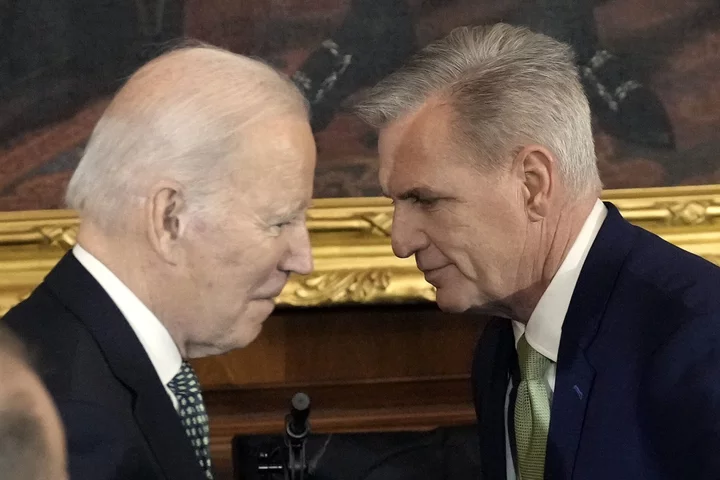The debt-limit agreement forged by President Joe Biden and House Speaker Kevin McCarthy heads into a crucial final stretch with less than a week to win congressional passage before a June 5 default deadline.
Biden and McCarthy spent much of the Memorial Day holiday lobbying members of their respective parties to build enough support ahead of a House vote expected Wednesday.
If the two leaders can overcome expected opposition from their flanks, the deal goes to the Senate, where a single objection risks triggering time-consuming procedures that threaten to bring the US right to the brink of a first-ever default.
“I never say I’m confident about what the Congress is going to do, but I feel very good about it,” Biden told reporters Monday.
Markets were closed Monday for the holiday, but there were signs of relief, with futures on the S&P 500 and Nasdaq 100 stock indexes up about 0.3% each.
The dollar, which has benefited from angst around the statutory borrowing limit, held Friday’s decline while Treasury futures linked to the 10- to 30-year part of the US government bond market rose on light volume, lowering yields.
Suspend Ceiling
The bill sets the course for federal spending through 2025 and will suspend the debt ceiling until Jan. 1, 2025, likely putting off another fight over federal borrowing authority until the middle of that year. In exchange for Republican votes for the suspension, Democrats agreed to cap federal spending for the next two years.
White House interpretation of the caps has it telling lawmakers the deal would lower spending by about $1 trillion over a decade, while the GOP argues the spending cut is double that. Restive conservatives, however, wanted to extract much deeper cuts.
“It’s pretty clear based on their public statements and where we are now that we’re the clear victors,” Representative Garret Graves, one of McCarthy’s chief negotiators, said on a call Monday.
The first test for the deal will come Tuesday afternoon before the House Rules Committee, which controls floor debate. The 13-member panel includes four Democrats and three far-right Republicans who are often critical of McCarthy.
One conservative on the committee, Representative Chip Roy of Texas, tweeted Monday that McCarthy had promised while running for speaker that nothing would pass muster in Rules without at least seven GOP votes. He and Ralph Norman, another Republican on the panel, already oppose the bill so they need just one more defector.
Spokespeople for McCarthy did not respond to requests for comment.
‘No’ Votes
Across the full House, are at least 10 GOP “no” votes. Representative Tom Emmer, Republican’s chief vote counter, worked the phones over the weekend to prevent that number from swelling much beyond that. His efforts will shift Tuesday to more direct attempts at persuasion as lawmakers return to the Capitol.
House Democratic leader Hakeem Jeffries and his top vote counter, Katherine Clark, are also trying to pin down votes they need for the bipartisan compromise.
Complicating their efforts is the Sierra Club, one of the nation’s best-known environmental groups, which on Monday urged opposition. The organization cited provisions that would expedite approvals for a natural gas pipeline running across West Virginia and time limits it would impose on environmental reviews of energy projects.
Some Democrats — including Representative Raul Grijalva, who leads his party on the House Committee on Natural Resources — are angry because of that language and could vote against it.
Wednesday passage in the House is critical to getting the bill through the Senate before the Monday deadline.
Senate Republican leader Mitch McConnell of Kentucky supports the deal, and has a long track record of finding Republican votes for deals like this one. But only one other Republican — Senator Mitt Romney of Utah — publicly supported the bill by Monday night and they need eight more to overcome an anticipated filibuster.
Hold-Up Threat
Conservative Senator Mike Lee of Utah has threatened to hold up passage of a bill he doesn’t like, and any senator has the power to force days of delay. At least three other conservative GOP senators — Rand Paul of Kentucky, Ron Johnson of Wisconsin and Ted Cruz of Texas — made clear in recent days they oppose the legislation.
Senators in both parties could also insist on voting on amendments to address the spending caps. Defense hawks are unhappy with a 3.3% increase proposed by Biden not keeping up with inflation.
Senator Lindsey Graham, a South Carolina Republican hawk, said on Monday that he’ll use “all powers available to me” to boost defense spending. He called on a 90-day increase in the debt ceiling instead to provide more time to work on that part of the accord.
Author: Billy House, Steven T. Dennis and Laura Litvan

